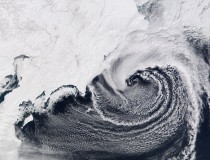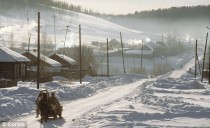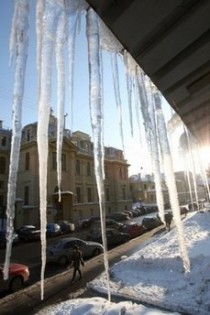By Will Stewart
In a new blow to the climate change lobby, Russia’s top weatherman today announced that the winter now drawing to a close in Siberia may turn out to be the coldest on record. ‘The winter of 2009-10 was one of the most severe in European part of Russia for more than 30 years, and in Siberia it was perhaps the record breaking coldest ever,’ said Dr Alexander Frolov, head of state meteorological service Rosgidromet.
Statistics are still being analysed in detail, but it is known that in western Siberia the mean temperature was minus 23.2C, with more colder days than in previous years. Russia’s top weatherman today announced that the winter now drawing to a close in Siberia may turn out to be the coldest on record. Some 63 days were colder than minus 25C and 39 days below minus 30C.

For this part of Siberia, this represents the coldest conditions in 40 years and the second harshest winter in 110 years. Equivalent statistics for colder eastern Siberia have not been issued yet. The coldest recorded temperature in the recent winter is believed to have been minus 57.4C degrees in Oymyakon on 20 January.
The remote town in eastern Siberia is the coldest inhabited community in the world. ‘When we say that this winter in Siberia was record breaking, we are aware that temperatures on some days of other years may have gone lower, but in the most recent winter the substantial cold was staying longer than usual and over larger regions than usual,’ said Dmitry Kiktev, deputy head of Rosgidromet.

‘There were periods of so-called “monotonous cold” when the weather was less diverse, and the cold remained strong and stable to record levels.’ Mr. Frolov also offered bad news for Russians hoping for a speedy respite from the long winter. ‘We can officially say that beginning of the spring in Russia is postponed for another seven to 10 days,’ he warned.
Beryozovka, Russia: The beginning of the spring in Russia has been postponed for another seven to 10 days, according to a Russian weatherman. The Urals and Siberia would continue to face ‘winter-like temperatures’ well into April, while European Russia would be below average, he said. Climate change adherents say the planet is warming due to man-made factors but Russian expert Professor Arkady Tishkov said yesterday that Siberia and the world are in fact getting colder.
‘From a scientific point of view, talk about increasing average temperatures on earth of several degrees are absurd,’ he said. Of course we can’t say that global warming is a myth and falsification. In many regions of planet the temperature is higher than expected because of human impact. ‘But the climate system of the planet is changing according to different cycles - from several years to thousand of years.
‘From the scientific point of view, in terms of large scale climate cycles, we are in a period of cooling. ‘The last three years of low temperatures in Siberia, the Arctic and number of Russia mountainous regions prove that, as does the recovery of ice in the Arctic Ocean and the absence of warming signs in Siberia.’
Mr Tishkov, deputy head of the Geography Institute at Russian Academy of Science, said: ‘What we have been watching recently is comparatively fast changes of climate to warming, but within the framework of an overall long-term period of cooling. This is a proven scientific fact. ‘The recent warming - and we are talking tenths of a degree at most - is caused by human activity, like forest elimination, the changing of landscapes.
‘The greenhouse gases so much discussed now do not in fact play big role. We have to remember that all the impact of industrial enterprises in Russia cannot be compared with one volcano eruption on our planet.’ On the latest Siberian statistics, Mr Kiktev said: ‘This winter does not prove that global warming is a myth, just as recent warm winters do not prove it does exist.
‘These are just small peaks in the climate process. What they show, if anything, we will be able to judge in tens of years from now.’ Read more here.
-------------------------
Killer icicles terrorise Russians
By Marina Koreneva Marina Koreneva - Wed Mar 24
SAINT PETERSBURG (AFP) - Walking along a Saint Petersburg Street immersed in music, Milana Kashtanova, became the latest victim of falling icicles and ice blocks that have killed five people and injured 147 in the city following Russia’s coldest winter in 30 years. Kashtanova, 21, has been in a coma since February when she was hit by the ice which was being cleared from a rooftop.

“Milana was just walking past a building in the city centre… There was no warning tape, nothing to alert people that people were working on the roof,” Kashtanova’s boyfriend, Irinei Kalachev, told AFP. The toll has prompted residents and relatives of victims to demand action against those responsible for what they believe to be careless clearing of ice from rooftops. “Every day, I go out into the street as if I was entering a war zone,” complained resident Boris Ilinsky, 28. “I’ve got to keep my eyes on the ground to avoid slipping and I’m also looking up to avoid falling lumps of ice,” he added.
In Kashtanova’s case, municipal authorities argued that the accident was her own fault, saying she ignored warning shouts from street cleaners because she was wearing headphones and listening to music, Kalachev said. But her outraged family has appealed to Russian President Dmitry Medvedev, demanding that he punish the city officials responsible. The city hall however says that accidents are inevitable given the scale of the ice-clearing after such a severe winter.
“The snow falls this winter have been unprecedented, a kind of natural disaster. Unfortunately, there are victims,” Yury Osipov, head of Saint Petersburg’s housing committee, told AFP. “There are 13,500 roofs in Saint Petersburg. With the current record snowfalls, the roofs should be cleared weekly to prevent blocks of ice. That’s impossible, not least because it would paralyse traffic in the city.”
The tragedy of Milana Kashtanova’s accident is not uncommon. Thousands of street cleaners take to the rooftops of Russia’s cities during the spring thaw, sweeping masses of snow and sharp-edged blocks of ice onto the pavements. That means that during Russia’s springtime thaw, residents are forced to run the gauntlet of snapping icicles and blocks of ice falling unexpectedly from roofs, as well as the ground-level hazards of slippery slush and puddles.
This week alone, a 55-year-old woman in central Moscow and a pensioner in the southwestern city of Voronezh were also killed by falling icicles, local investigators said. Residents in Saint Petersburg complain that local authorities do not take proper precautions to protect the public. “I have seen city employees clearing roofs without putting in place any safeguards to protect passersby,” said city resident Marina Romanova.
In the face of mounting criticism, however, Saint Petersburg governor Valentina Matviyenko, has yielded to the pressure and threatened to fire dozens of city officials. Read story here.




